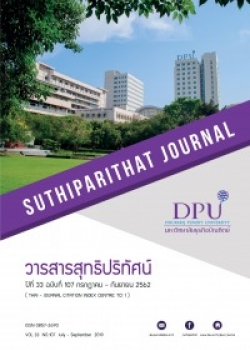ปัจจัยเชิงเหตุและผลของพฤติกรรมการทำงานตามหลักปรัชญาเศรษฐกิจพอเพียงของพนักงานโรงงานอุตสาหกรรมผลิตชิ้นส่วนยานยนต์
คำสำคัญ:
พฤติกรรมการทำงาน, หลักปรัชญาเศรษฐกิจพอเพียง, การขัดเกลาทางสังคมจากครอบครัว, การขัดเกลาทางสังคมจากองค์การ, สมดุลระหว่างงานและชีวิต, ประสิทธิผลของงาน, การบรรลุความสำเร็จในชีวิต, วิถีชีวิตแบบทางสายกลาง, โรงงานอุตสาหกรรมผลิตชิ้นส่วนยานยนต์บทคัดย่อ
การวิจัยครั้งนี้มีวัตถุประสงค์เพื่อพัฒนาแบบจำลองความสัมพันธ์ของปัจจัยเชิงเหตุและผลของพฤติกรรมการทำงานตามหลักปรัชญาเศรษฐกิจพอเพียงของพนักงานโรงงานอุตสาหกรรมผลิตชิ้นส่วนยานยนต์ ใช้แบบสอบถามในการเก็บข้อมูลจากพนักงานโรงงานอุตสาหกรรมผลิตชิ้นส่วนยานยนต์ 58 แห่ง จำนวน 500 คน ได้มาด้วยวิธีการสุ่มแบบหลายขั้นตอน วิเคราะห์ข้อมูลเบื้องต้นด้วยโปรแกรม SPSS for Windows และวิเคราะห์ความสอดคล้องของแบบจำลองโครงสร้างความสัมพันธ์ด้วยโปรแกรม LISREL ผลการวิจัยพบว่า (1) แบบจำลองความสัมพันธ์เชิงเหตุและผลของพฤติกรรมการทำงานตามหลักปรัชญาเศรษฐกิจพอเพียงของพนักงานโรงงานอุตสาหกรรมผลิตชิ้นส่วนยานยนต์หลังจากการปรับมีความสอดคล้องกับข้อมูลเชิงประจักษ์ มีค่าสถิติ χ2=96.20, df=108, p-value = .78, GFI = .98, AGFI = .96, SRMR = .02, RMSEA =.00, CN = 737.63 (2) วิถีชีวิตแบบทางสายกลาง การขัดเกลาทางสังคมจากครอบครัว การขัดเกลาทางสังคมจากองค์การส่งผลทางตรงต่อพฤติกรรมการทำงานตามหลักปรัชญาเศรษฐกิจพอเพียง 3) พฤติกรรมการทำงานตามหลักปรัชญาเศรษฐกิจพอเพียงส่งผลทางตรงต่อสมดุลระหว่างงานและชีวิต 4) การขัดเกลาทางสังคมในครอบครัวและสมดุลระหว่างงานและชีวิตส่งผลต่อการบรรลุความสำเร็จในชีวิต และ 5) การขัดเกลาทางสังคมในองค์การและพฤติกรรมการทำงานตามหลักปรัชญาเศรษฐกิจพอเพียงส่งผลทางตรงต่อประสิทธิผลของงาน
เอกสารอ้างอิง
ขจรศักดิ์ เพ็ชรรัตน์. (2554). การสร้างความสุขในที่ทำงาน. พัทลุง: มหาวิทยาลัยทักษิณ.
จำรอง เงินดี. (2552). จิตวิทยาสังคม. กรุงเทพฯ: โอ เอส พริ้นติ้ง เฮ้าส์.
ณรงค์ เส็งประชา. (2541). มนุษย์กับสังคม (ฉบับปรับปรุงใหม่). กรุงเทพฯ: โอเดียนสโตร์.
ดุจเดือน พันธุมนาวิน, และ ดวงเดือน พันธุมนาวิน. (2550). หลักเศรษฐกิจพอเพียงในระดับบุคคล: ทฤษฎีและผลการวิจัยเพื่อสร้างดัชนีในแนวจิตพฤติกรรมศาสตร์. วารสารพัฒนบริหารศาสตร์, 47(1), 27-79.
ทองทิพภา วิริยะพันธุ์. (2550). เศรษฐกิจพอเพียง: ความพอเพียงมวลรวมในประเทศ (พิมพ์ครั้งที่ 2). กรุงเทพฯ: G.P.Cyberprint.
เทพนม เมืองแมน, และสวิง สุวรรณ. (2540). พฤติกรรมองค์การ (พิมพ์ครั้งที่ 2). กรุงเทพฯ: ไทยวัฒนาพานิช.
ธีรเดช ฉายอรุณ. (2542). การศึกษาการปรับตัวในการทำงานของพยาบาลวิชาชีพเข้าใหม่โดยใช้การสำรวจซ้ำสองช่วงเวลา (วิทยานิพนธ์วิทยาศาสตรดุษฎีบัณฑิต สาขาการวิจัยพฤติกรรมศาสตร์ประยุกต์). กรุงเทพฯ: มหาวิทยาลัยศรีนครินทรวิโรฒ.
ปราโมทย์ มลคล้ำ, นวลฉวี ประเสริฐสุข, สมทรัพย์ สุขอนันต์, และกมล โพธิเย็น. (2553). พฤติกรรมการดำเนินชีวิตตามหลักเศรษฐกิจพอเพียงของผู้นำครอบครัวในเขตปกครองท้องที่ อำเภอเมืองจังหวัดนครปฐม. วารสารพฤติกรรมศาสตร์เพื่อการพัฒนา, 2(1), 89-103.
พรชนก ทองลาด. (2553). การวิจัยเรื่องการบริหารการเงินตามหลักเศรษฐกิจพอเพียงของผู้ประกอบการอุตสาหกรรมเซรามิกในจังหวัดลำปาง ลำพูนและเชียงใหม่ (รายงานการวิจัย). ลำปาง: มหาวิทยาลัยราชภัฏลำปาง.
พระธรรมปิฏก. (2544). พุทธธรรม (ฉบับเดิม). กรุงเทพฯ: สหธรรมิก.
ภรณี กีร์ติบุตร. (2529). การประเมินประสิทธิผลขององค์การ. กรุงเทพฯ: โอเดียนสโตร์.
ภาวิณี เพชรสว่าง. (2549). นโยบายและแนวทางปฏิบัติการบริหารสมดุลระหว่างงานและชีวิต. วารสารวิชาการมหาวิทยาลัยหอการค้าไทย, 26(3), 110-123.
ศิรภัสสร วงศ์ทองดี. (2552). การสร้างสมดุลระหว่างงานและชีวิต: Work-Life Balance/Work-Life Effectiveness. กรุงเทพฯ: สำนักงานปลัดกระทรวงมหาดไทย.
สมพร เทพสิทธา. (2549). ดวงประทีปจากพระบรมราโชวาทพระบาทสมเด็จพระเจ้าอยู่หัวเพื่อถวายราชสักการะแด่พระบาทสมเด็จพระเจ้าอยู่หัวในมหามงคลสมัยทรงครองสิริราชสมบัติครบ 60 ปี. กรุงเทพฯ: พิมพ์สวย.
สำนักงานคณะกรรมการข้าราชการพลเรือน. (2548). เอกสารประกอบการสัมมนาเรื่องสมรรถนะของข้าราชการ: การปรับใช้สมรรถนะในการบริหารทรัพยากรมนุษย์. กรุงเทพฯ: สำนักงานคณะกรรมการข้าราชการพลเรือน.
สำนักงานคณะกรรมการพิเศษเพื่อประสานงานโครงการอันเนื่องมาจากพระราชดำริ. (2550). เศรษฐกิจพอเพียง: ปรัชญาชี้ถึงแนวทางการดำรงชีวิต. กรุงเทพฯ: สำนักงานคณะกรรมการพิเศษเพื่อประสานงานโครงการอันเนื่องมาจากพระราชดำริ.
สุวัฒน์ จันทรจำนง. (2547). แก่นพุทธธรรม (ฉบับอังกฤษ-ไทย). กรุงเทพฯ: ตถาตาพับลิเคชั่น.
อภิชัย พันธเสน, สรวิชญ์ เปรมชื่น, และ พิเชษฐ์ เกียรติเดชปัญญา. (2546). การประยุกต์พระราชดำริเศรษฐกิจพอเพียงกับอุตสาหกรรมขนาดกลางและขนาดย่อม. กรุงเทพฯ: สำนักงานกองทุนสนับสนุนการวิจัย.
Bogt, T. T., Raaijmakers, Q., & Wel, F. V., (2005). Socialization and development of the work ethic among adolescents and young adults. Journal of Vocational Behavior, 66, 420-437.
Bollen, K. A. (1989). Structural equations with latent variables. New York: John Wiley and Sons.
Cohen-Scali, V. (2003). The influence of family, social, and work socialization on the construction of the professional identity of young adults. Journal of Career Development, 29(4), 237-249.
Dorer, H. L., & Mahoney, J. M. (2006). Self-actualization in the corporate hierarchy. North American Journal of Psychology, 8(2), 397-410.
Greenhaus, J. H., Collins, K. M., & Shaw, J. D. (2003). The relation between work-family balance and quality of life. Journal of Vocational Behavior, 63(3), 510-513.
Gresuc, J. E., & Hastings, P. D. (2007). Handbook of socialization: Theory and research. New York: The Guilford Press.
Gruman, J. A., Saks, A. M., & Zweing, D. I. (2006). Organizational socialization tactics and newcomer proactive behaviors: An integrative study. Journal of Vocational Behavior, 69, 90-104.
Harpaz, I., Honing, B., & Coetsier, P. (2002). A cross-cultural longitudinal analysis of the meaning of work and the socialization process of career starters. Journal of World Business, 37, 230-244.
Heck, R. (1995). Organizational and professional socialization: Its impact on the performance of new administrators. Urban Review, 27, 31-49.
Heylighen, F. (1992). A cognitive-systemic reconstruction of maslow’s theory of self-actualization. Behavioral Science, 37, 39-57.
Jex, S. M., & Britt, T. W. (2008). Organizational psychology: A scientist-practitioner approach (2nd ed.). New Jersey: John Wiley & Son.
Lawless, D.J. (1972). Effective management: Social psychological approach. New Jersey: Prentice-Hall.
McShane, S. L., & Von Glinow, M. (2003). Organizational behavior: Emerging realities for the workplace revolution. Boston: McGraw-Hill/Irwin.
Meerakate, J., Jitsanguan, T., & Thuvachote, S. (2012). Leisure time allocation in accordance with the sufficiency economy philosophy of adolescents in Bangkok. Kasetsart Journal: Social Sciences, 33(3), 464-474.
Rhoades, D.R., & McFarland, K. F. (2000). Purpose in life and self-actualization in agency-supported caregivers. Community Mental Health Journal, 36(5), 513-521.
Saks, A.M., Uggerslev, K. L., & Fassina, N. E. (2007). Socialization tactics and newcomer adjustment: A meta-analytic review and test of a model. Journal of Vocational Behavior, 70, 413-446.
Tabachnick, B. G., & Fidell, L. S. (2007). Using multivariate statistics (5th ed.). New York: Allyn and Bacon.
Victoria. (2007). Work and family balance manual: Better practices for better business. Retrieved December 12, 2011, from www.business.vic.gov.au/busvicwr/_assets/main/lib60072/work&family.pdf
ดาวน์โหลด
เผยแพร่แล้ว
รูปแบบการอ้างอิง
ฉบับ
ประเภทบทความ
สัญญาอนุญาต
เนื้อหาและข้อมูลในบทความที่ลงตีพิมพ์ในวารสารสุทธิปริทัศน์ ถือเป็นข้อคิดเห็นและความรับผิดชอบของผู้เขียนบทความโดยตรงซึ่งกองบรรณาธิการวารสาร ไม่จำเป็นต้องเห็นด้วย หรือร่วมรับผิดชอบใด ๆ
บทความ ข้อมูล เนื้อหา รูปภาพ ฯลฯ ที่ได้รับการตีพิมพ์ในวารสารสุทธิปริทัศน์ ถือเป็นลิขสิทธิ์ของวารสารสุทธิปริทัศน์หากบุคคลหรือหน่วยงานใดต้องการนำทั้งหมดหรือส่วนหนึ่งส่วนใดไปเผยแพร่ต่อหรือเพื่อกระทำการใด ๆ จะต้องได้รับอนุญาตเป็นลายลักษณ์อักษรจากวารสารสุทธิปริทัศน์ก่อนเท่านั้น







